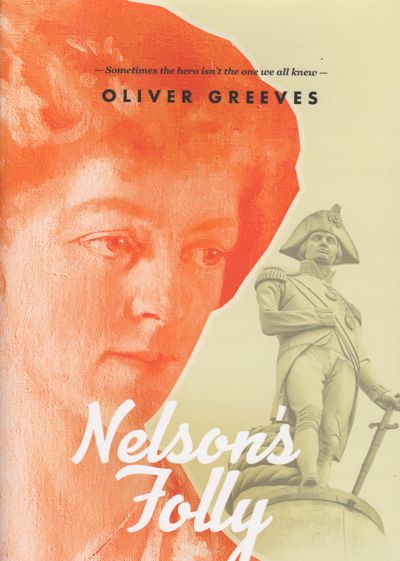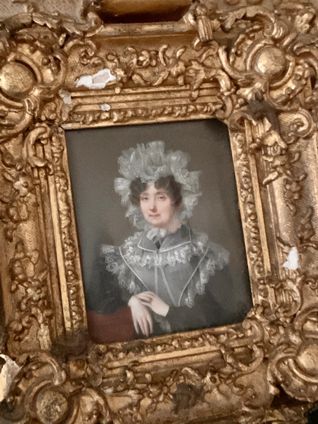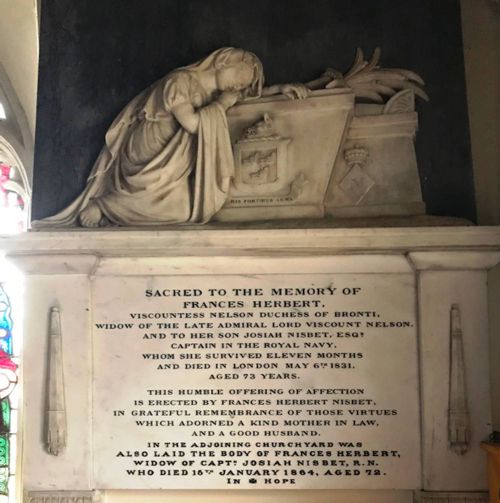
Blurb
Horatio and Fanny Nelson live, poor but happy, in his father’s damp parsonage in Norfolk.
The French Revolutionary Wars have begun, and as fighting intensifies, Horatio is recalled to sea.
As the years pass and the war rages on, Horatio Nelson becomes a lauded hero, while Fanny loyally manages their affairs back in England. But Horatio’s success in battle has changed him – he’s proud, arrogant, bitter. How can a woman like Fanny, self-reliant but bound by 18th century attitudes, face down the Navy’s superstar without losing everything?
A compelling exploration of duty in all its forms, Nelson’s Folly is a sweeping, historically rich novel based on the true story of Horatio and Fanny Nelson and their lives together – and apart.
The story behind Nelson’s Folly: Searching for my Ancestor
My novel, Nelson’s Folly, a Napoleonic era adventure story exploring the relationships and battles of British naval hero Admiral Lord Horatio Nelson, provides new insights as it gives a voice to those his heroism left in its wake. I also set out to answer the question, was his wife, my ancestor, really a cold-hearted shrew as seemed to be her legacy, or was she actually his most devoted supporter?
The Curious Child
Despite the hero in our family history, no one spoke of Lord Admiral Horatio Nelson and his wife Fanny when I was growing up. Desperate to know more, the first person outside the family I asked about my ancestor Fanny Nelson, was the guide on the Victory. “Cold-hearted b***h,” he muttered. I didn’t pursue it any further.
My father had a different view. “Poor Lady Nelson,” he said with a sigh, “she loved him to the very end.” But he refused to elaborate. Needless to say, I was dissatisfied with this, feeling there was some shame attached to the matter. My curiosity for the truth behind Fanny and Nelson’s relationship started young. It was there when I attended my first writing course at the New School in Greenwich Village New York in 1971, but I had no idea then what a key role it would play in my search as a writer for a story yearning to be told.
The Family
My family connection is through my Grandmother, Bertha Eccles, who I recall as reserved, beautiful and strong.
When I asked my grandmother about Horatio she was loathe to say anything despite the pleas of a young boy eager to hear all about my hero’s exploits and his fame. I soon learned that the topic was off limits.
She was an Edwardian through and through. Her father was a very prominent doctor with a fine house in the centre of Plymouth overlooking the Sound where Nelson would have anchored his battleship to take on supplies, before heading for the Mediterranean. Bertha’s mother, Francis, was the great granddaughter of Fanny. I never met her, of course, but I knew her daughters Patricia, Ursula, Letitia and Bertha. They were members of a strict Christian family and, like many women of similar social background, their education concluded with finishing school in Switzerland.
Fanny’s Image

Fanny’s inside story again called out to be told when I inherited a famous miniature of her, painted when she was in middle age.
Most of Fanny’s possessions passed to her daughter in law’s family and her descendants who include the Meade family and the Humphrey-Davy family. But Bertha inherited some of the memorabilia and she passed it on to her daughter, my favourite aunty; Hope Purdom who lived in St Andrews in Scotland. When Hope died without children of her own she bequeathed everything to my siblings and to me. The painting was reproduced in a book that I also inherited; Nelson’s Wife the only biography of Fanny – until recently – by E.M Keate, a daughter of the Head Master of Eton.
One passage caught my attention:
“(Horatio) often declared, and so did many of his friends, that his marriage (to Fanny) was of equal service to his character to any naval exploit he had achieved. While he was near her no step was ever taken, not any letter despatched, without being submitted to the opinion of his highly esteemed counsellor with her sound judgement and cultivated understanding.”
This was a Fanny I had never been told about. This book answered many of my questions but not why a capable woman respected in the 18th century went on to be treated appallingly by the man she loved who was worshipped as a hero by modern society.
Interestingly the book, published in 1939, attracted considerable and favourable opinion. A launch party in Kensington given by one of Fanny’s descendants, J Nelson Humphrey-Davy, included among those present; Earl Nelson, the great, great, nephew of the Admiral as well as the descendants of Nelson’s Captains like Sir Sydney Freemantle as well as many serving Admirals and Commander Percy Nisbet and Miss Nisbet, “representing Josiah Nisbet.” Interestingly “Count and Countess Tolstoy”, no doubt a power couple of the day, were also present.

Long-Lost Letters
The answer to the mystery of her character was finally clearly revealed in 2005 with the publication of “Nelson, the New Letters by Colin White” and later by Martyn Downer who discovered Nelson’s Prize agent’s letters in the attic of a Scottish Manor House. Long lost letters proved that rather than being a cold-hearted shrew – which supporters of Nelson’s mistress Emma had purveyed – Fanny was a warm-hearted, supportive wife who loved her faithless man to the end.
Uncovering the Nuances
The writer within me turned to fiction to further explore the story in a way less limiting than a historical biography. My research continued, but I was not close to my grandmother’s cold, aristocratic family and was busy connecting with my Irish family and even more by my Icelandic family – my father being Irish and my mother Icelandic. I mentally assigned the project to a time in my life when I could spend time developing the story and uncovering its nuances. That time is now. I hope you enjoy the characters, battles, politics and revelations in my debut novel: “Nelson’s Folly”, with the adventure to continue through Josiah’s story.
Amazon.com: https://smile.amazon.com/Nelsons-Folly-Oliver-Greeves/dp/0645023701
Amazon UK | Booktopia | Dymocks |
Meet Oliver Greeves

Oliver is a direct descendant of Frances (Fanny), Viscountess Nelson and her son, Josiah Nisbet, and a keen historian who believes in the importance of truth-telling in historical fiction. He has a PhD in history from Bristol University, UK, and studied creative writing at the New School in Greenwich Village New York. Oliver spent many years working on Wall Street and now lives near his beloved Sydney Harbour in Sydney, Australia. When not writing, he spends his time sailing and advising executive business leaders and the next generation. Long fascinated by Fanny’s life and times, he has travelled extensively researching her story and the turbulent times of the French Revolutionary Wars and the Napoleonic War. He has now embarked on recreating stories of the era based on historical fact, while using to explore the psyche and characters behind the myths.
Connect with Oliver
E-Mail | ogreeves@gmail.com
Learn more about Nelsons Folly My website – www.fannynelsonfan.com
Follow me on Facebook | LinkedIn
Twitter: @OliverGreeves